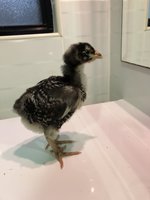Navigation
Install the app
How to install the app on iOS
Follow along with the video below to see how to install our site as a web app on your home screen.
Note: This feature may not be available in some browsers.
More options
You are using an out of date browser. It may not display this or other websites correctly.
You should upgrade or use an alternative browser.
You should upgrade or use an alternative browser.
Is this a rooster?
- Thread starter JakeBarnes
- Start date
- Jan 30, 2015
- 58,387
- 243,314
- 1,717
I'm certainly no expert, but the posture alone would lead me to think its a cockerel.
- Thread starter
- #3
JakeBarnes
In the Brooder
Yes that’s the big one for me as wellI'm certainly no expert, but the posture alone would lead me to think its a cockerel.
Hyper_Chicken05
Songster
Yeah and the comb is a little big but 4 weeks is a bit young to have a clear indication
As the others have written, it is a bit young to say with certainty but his is expressing all the characteristics of a cockerel.
Did you buy sexed chicks? 2 for 4 is a pretty lousy accuracy percentage.
Did you buy sexed chicks? 2 for 4 is a pretty lousy accuracy percentage.
- Thread starter
- #6
JakeBarnes
In the Brooder
As the others have written, it is a bit young to say with certainty but his is expressing all the characteristics of a cockerel.
Did you buy sexed chicks? 2 for 4 is a pretty lousy accuracy percentage.
No they didn’t guarantee the sex, though they said they would do their best. They were a couple of weeks old when we got them as replacements for the day olds we originally got that died of cocci. If we replace these two we will have taken home nine chicks in six weeks. We only wanted to get two initially lol! (Though we were planning on expanding the flock pretty quickly. It’s been an experience
I'm no expert but it appears to be a cockerel.
I wouldn't jump to conclusions yet. My 4 week old BR males have honking red/large combs already most of the time. Most hatchery BR pullets have a decent amount of dark wash down the leg fronts. I see some on that chick. The only thing that says male to me, a BR breeder, is the slower feathering, but you also said it was smaller so that may also be part of that issue as well. Sometimes, they can fool you. I'd expect more red in a comb of a 4 week old BR cockerel, personally. The stance I've seen in pullets of mine.
Here is a 4 week old BR cockerel from one of my lines, though he may actually be slightly younger than that. They were hatched in June and this is July 2 the pic was taken.

This was my first BR pullet, from a hatchery. Folks said she was a male for weeks and weeks. This was way before I had the experience I do now. She always had the stance of a male, even the coloring veered to the male side, but she was the mother of many sons before she passed away.
This is really more the fast feathering I expect of a hatchery BR pullet. My heritage line pullets don't have tails that long, though they are definitely darker.
Best sexing method, even with breeds that have color cues: Time!

This is really more the fast feathering I expect of a hatchery BR pullet. My heritage line pullets don't have tails that long, though they are definitely darker.
Best sexing method, even with breeds that have color cues: Time!
Similar threads
- Replies
- 15
- Views
- 1K
New posts New threads Active threads
-
Latest threads
-
-
What are Your Go-To Recipes for Using Up Eggs?
- Started by GlicksChicks
- Replies: 0
-
-
French countryside ornamentale chicken amateur (Japaneses bantams)
- Started by AbL
- Replies: 3
-
-
-
Threads with more replies in the last 15 days
-
-
-
-
-
Please Help! Eggbound & Possible Prolapsed Vent
- Started by Elspeth Dinsmore
- Replies: 82
-





